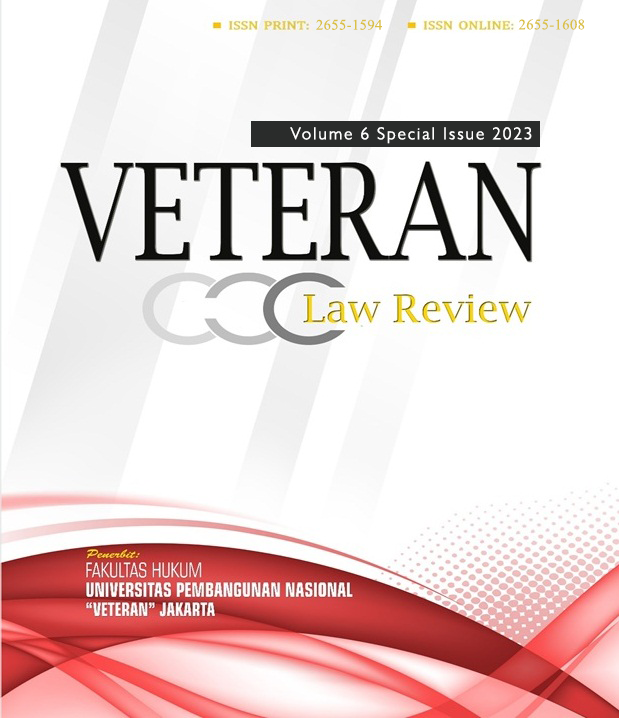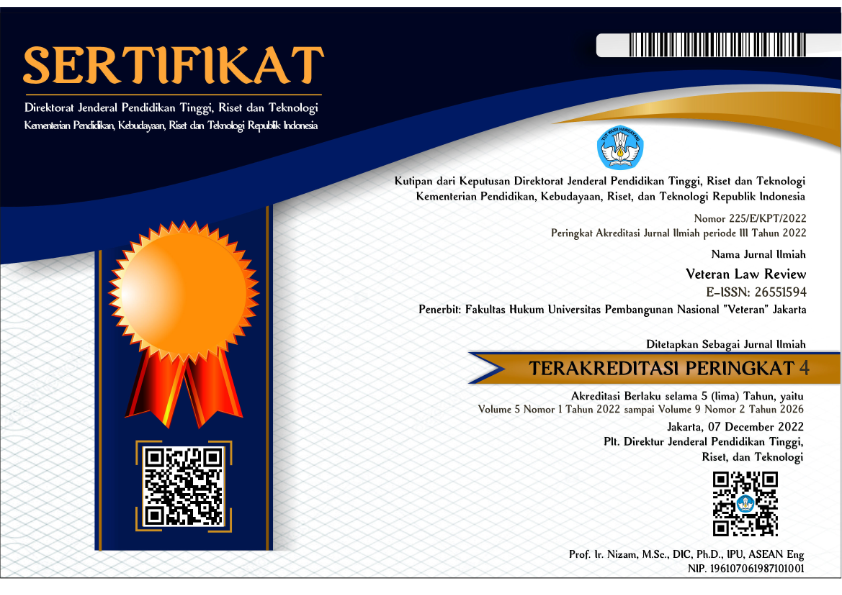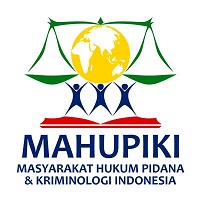The Development of Procedural Law Through the E-Court System After Pandemic in Indonesia
DOI:
https://doi.org/10.35586/velrev.v6iSpecialIssues.4957Keywords:
Development, Procedural Law, E-Court System, Pandemic.Abstract
Technological developments and Covid 19 Pandemic "forced" the Supreme Court (MA) to make breakthrough in procedural law, namely by launching E-Court application, through MA rules Number 3 of 2018 which was exchanged for rules Number 1 of 2019 concerning Case Administration and Trial in E-Courts. E-Court is instrument in court for service of case registration depositing case money to court summons and trial and online delivery of court documents. This study aims to analyze and provide an overview to public of breakthroughs made by the MA for Development of Procedural Law through e-court system. Research method used qualitative research, normative juridical approach. The development of procedural law was initially only intended for registration and examination of civil cases through Supreme Court rules (Perma) No. 3 of 2018 was replaced with Perma No. 1 of 2019 concerning Case Administration and Trial in Electronic Courts. But then e-court is not only for civil cases, it’s also to adjudicate criminal cases with issuance of MA regarding the online criminal trial file Number 4 of 2020. The application for electronic proceedings is an attempt by the Supreme Court to eliminate the obstacles commonly experienced by the judiciary, namely the lack of speed in resolving cases, the difficulty of obtaining data from the court, and the credibility of the integrity of the judiciary, especially judgesDownloads
References
Journal/Articles:
Alfiyan Mardiansyah. (2021). Pelaksanaan Persidangan Perkara Pidana Secara Elektronik Pada Masa Pandemi Covid- 19 Di Pengadilan Negeri Kota Palembang. Jurnal LEGISLASI INDONESIA. 18 (2). 222-232.
Anggita Doramia Lumbanraja. (2020). Perkembangan Regulasi dan Pelaksanaan Persidangan Online di Indonesia dan Amerika Serikat Selama Pandemi Covid-19, JURNAL CREPIDO: Jurnal Mengenai Dasar-Dasar Pemikiran Hukum: Filsafat dan Ilmu Hukum. 2 (1). 46-58.
Anggita Yulistia, Karina Luana Pramesti widodo, & Imam Budi Santoso. (2021). Penyelenggaraan E-Court dan E-Litigati pada Pengadilan Tata Usaha Negara Berdasarkan Perma Nomor 1 Tahun 2019. JUSTITIA : Jurnal Ilmu Hukum dan Humaniora. 8 (6). 1532
Atika Ismail. (2021). Analisis Alternatif Restruturisasi Utang Atau Penutupan Perusahaan Pada Pandemi Covid-19 Melalui PKPU, Kepailitan Dan Likuidasi. Jurnal Kepastian Hukum Dan Keadilan. 3 (1). 43-56.
Beni Kurniawan, M. (2020). Implementation of Electronic Trial (E-Litigation) on the Civil Cases In Indonesia Courtas a Legal Renewal of Civil Procedural Law. Jurnal Hukum dan Peradilan. 9 (1). 45.
Faisal Luqman Hakim. (2019). Simplikasi Prosedur Beracara dengan Pemanfaatan Teknologi dalam Rancangan Undang-Undang Hukum Acara Perdata. JHAPER: Jurnal Hukum Acara Perdata. 5 (1). 1.
Jeni Danurahman, Eny Kusdarini. (2021). Dampak Pandemi Coronavirus Disease (Covid-19) dalam Perspektif Hukum di Era Digital. Masalah-Masalah Hukum. 50 (2). 151-160
Nazir, M. Perkembangan Hukum Acara Pada Masa Pandemi Covid- 19, Makalah, disampaikan pada Kuliah Umum Fakultas Hukum Universitas Malikussaleh tanggal 7 Oktober 2021.
Nur Akmal Razaq. (2020). Legalitas Persidangan Daring di Masa Pandemi Covid -19 Dalam Perspektif Hukum Pidana, Jurnal Inovasi Penelitian. 1 (6). 1227-1230.
Rizkia Ramadhana & Muzakkir Abubakar. (2021). Efektifitas Sistem Layanan E-Court dalam Perkara Perdata di Pengadilan Negeri Banda Aceh, JIM Bidang Hukum Perdata. 5, (.2). 282.
Sari, Ni Putu Riyani Kartika. (2019). Eksistensi E-Court Untuk Mewujudkan Asas Sederhana, Cepat dan Biaya Ringan Dalam Sistem Peradilan Perdata di Indonesia, Jurnal Yustitia. Bali: Universitas Ngurah Rai. 13 (1).
Sonyendah Retnaningsih, Disriani Latifah Soroinda Nasution, Rouli Anita Velentina, & Kelly Manthovani. (2020). Pelaksanaan E-Court Menurut Perma Nomor 3 Tahun 2018 tentang Administrasi Perkara di Pengadilan Secara Elektronik dan E-litigation Menurut Perma Nomor 1 Tahun 2019 Tentang Administrasi Perkara dan Persidangan di Pengadilan Secara Elektronik (Studi di Pengadilan Negeri di Indonesia). Jurnal Hukum & Pembangunan. Tahun ke-50 (1). 126.
Susanto, Muhamad Iqbal, & Wawan Supriyatna. (2020). Creating an Efficient Justice System with E-Court System in State Court and Religious Court of Rights. International Journal of Arts and Social Science. 3 (3), 354.
Tiara Almira Raila, Sinta Dewi Rosadi Rika, Ratna Permata. (2020). Perlindungan Data Privasi Di Indonesia Dan Singapura Terkait Penerapan Digital Contact Tracing Sebagai Upaya Pencegahan Covid-19 Serta Tanggung Jawabnya. Jurnal Kepastian Hukum Dan Keadilan. 2 (1). 1-16.
Books with an author:
Aan Komariah & Djam’an Satori. (2011). Metode Penelitian Kualitatif. Bandung: Alfabeta.
Ahmad Tanzeh. (2011). Metodologi Penelitian Praktis. Yogyakarta: Teras.
Amir Hamzah, Moh. (2013). Hukum Acara Perdata Peradilan Tingkat Banding. Malang: Setara Press.
Mahkamah Agung Republik Indonesia. (2019) Buku Panduan E-Court 2019. Jakarta: The Electronic Justice System.
-------------------------, (2018) Buku Panduan E-Court Pendaftaran Online untuk Pengguna Terdaftar. Jakarta: Mahkamah Agung RI.
Masyhudi & Sigid Suseno, (2020). Sidang Virtual: Idealime, Peluang, Tantangan, dan Implementasinya, Jakarta: Kompas Media Nusantara.
Mohammad Saleh. (2016). Penerapan Asas Peradilan, Sederhana, Cepat, dan Biaya Ringan Pada Eksekusi Putusan Perkara Perdata, Cet. 3, Yogyakarta: Graha Cendekia.
Soerjono Soekanto. (1986). Pengantar Penelitian Hukum. Jakarta: Universitas Indonesia.
Regulations
Undang-Undang Nomor 48 Tahun 2009 tentang Kekuasaan Kehakiman (Lembaran Negara Republik Indonesia Tahun 2009 Nomor 157, Tambahan Lembaran Negara Republik Indonesia Nomor 5076);
Peraturan Mahkamah Agung Nomor 3 Tahun 2018 tentang Administrasi di Pengadilan Secara Elektronik.
Peraturan Mahkamah Agung Nomor 1 Tahun 2019 tentang Administrasi Perkara dan Persidangan di Pengadilan Secara Elektronik.
Peraturan Mahkamah Agung Republik Indonesia Nomor 4 Tahun 2020 tentang Administrasi dan Persidangan Perkara Pidana Di Pengadilan Secara Elektronik.
Downloads
Published
How to Cite
Issue
Section
License
Copyright (c) 2023 Veteran Law Review

This work is licensed under a Creative Commons Attribution-ShareAlike 4.0 International License.
Copyright (c) 2022 Veteran Law Review Journal
Veteran Law Review © 2022 by Faculty of Law Universitas Pembangunan Nasional "Veteran" Jakarta is licensed under Creative Commons Attribution 4.0 International

1. License
The non-commercial use of the article will be governed by the Creative Commons Attribution license as currently displayed on Creative Commons Attribution 4.0 International.
2. Author(s)' Warranties
The author warrants that the article is original, written by the stated author(s), has not been published before, contains no unlawful statements, does not infringe the rights of others, is subject to copyright that is vested exclusively in the author, and free of any third party rights, and that any necessary written permissions to quote from other sources have been obtained by the author(s).
3. User/Public Rights
VELREV's spirit is to disseminate articles published are as free as possible. Under the Creative Commons Attribution-ShareAlike 4.0 International License. VELREV permits users to copy, distribute, display, and perform the work for non-commercial purposes only. Users will also need to attribute authors and VELREV to distributing works in the journal and other media of publications.
4. Rights of Authors
Authors retain all their rights to the published works, such as (but not limited to) the following rights;
- Reproduce the work
- Prepare derivative works based upon the work
- Distribute copies of the work
- Perform the work publicly
- Display the work publicly
- Copyright and other proprietary rights relating to the article, such as patent rights,
- The right to self-archive the article,
- The right to enter into separate, additional contractual arrangements for the non-exclusive distribution of the article's published version (e.g., post it to an institutional repository or publish it in a book), with an acknowledgement of its initial publication in this journal (Veteran Law Review).
5. Co-Authorship
If the article was jointly prepared by more than one author, any author submitting the manuscript warrants that he/she has been authorized by all co-authors to be agreed on this copyright and license notice (agreement) on their behalf, and agrees to inform his/her co-authors of the terms of this policy. VELREV will not be held liable for anything that may arise due to the author's internal dispute. VELREV will only communicate with the corresponding author.
6. Royalties
Being an open accessed journal and disseminating articles for free under the Creative Commons license term mentioned, author(s) are aware that VELREV entitles the author(s) to no royalties or other fees.
7. Miscellaneous
VELREV will publish the article (or have it published) in the journal if the article’s editorial process is successfully completed. JOSI's editors may modify the article to a style of punctuation, spelling, capitalization, referencing, and usage that deems appropriate. The author acknowledges that the article may be published so that it will be publicly accessible and such access will be free of charge for the readers as mentioned in point 3.


















